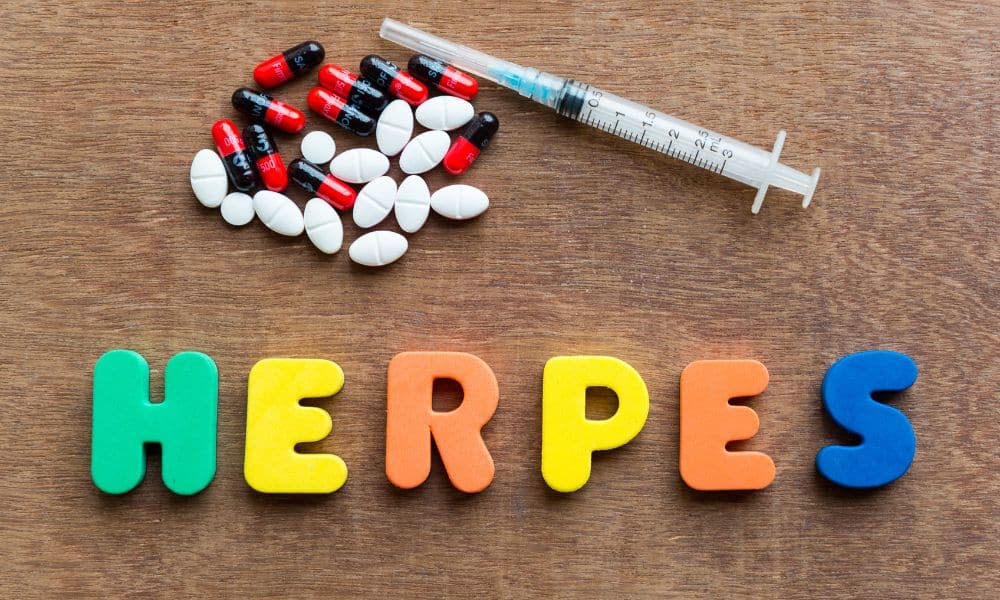Herpes has been around for a long time, but the stigma of having it is still strong. No one wants to have something that they can quickly spread, and everyone talks about how bad they are. However, there are many ways to protect yourself from this virus if you know what you’re doing. This article will go over everything you need to know to stay safe.
Herpes is a severe but common sexually transmitted disease that can be both physically and emotionally scarring. For example, the herpes simplex virus (HSV) causes blisters, of which there are two types: HSV-1 and HSV-2. While HSV-1 usually affects the mouth area, leaving cold sores or fever blisters on your lips, gums, tongue, or throat, HSV-2 typically affects the genital region of men and women.
The virus spreads through skin-to-skin contact
Both strains of this virus spread through skin-to-skin contact with someone who already has it – whether they have an open sore – and sharing items like towels used after sex with an infected partner. Although there is no cure for herpes yet, you can take care of your sexual health and avoid infecting others. But if you notice the symptoms of herpes, don’t panic! Herpes treatment is available to reduce the discomfort of herpes outbreaks.
It’s a common misconception that herpes is only contagious when there are symptoms present. However, it can be contagious even if you don’t have visible signs or symptoms. The Centers for Disease Control and Prevention estimates that one in six people between 14-49 years old has genital herpes. Unfortunately, that means you’re probably not immune to this virus because you have had no outbreaks yet – but don’t worry!
How contagious is herpes?
Herpes is a prevalent but incurable disease. In the United States alone, about 20% of adults have genital herpes and from 50 to 80 percent have oral herpes caused by the herpes simplex virus I or II. Much of that is because of ignorance about how herpes is transmitted. The obvious route of transmission is through sexual contact with an infected person. But as you might be surprised to know that there are several other ways the virus can be transmitted, some of which are much more likely than others.
Humans most commonly transfer herpes through direct contact with an infected person’s genitals or mouth. That means if they don’t have a visible sore on their lips, chances are they can’t give you oral herpes. Likewise, if they don’t have a visible sore on their genitals, then chances are they can’t give you genital herpes. Even if they have a sore, though, the virus can survive for a short period on exposed skin. That means even if it’s possible to get herpes from someone who has a visible herpes sore, getting it is still unlikely.
A person can also transmit herpes when no symptoms are present. If the person has herpes, engage in oral sex or manual sex (fingering) after touching herpes sore and then touching their partner’s genitals, anus, or mouth.
Who has the highest herpes infection rate?
A woman is more likely to catch herpes from a man than a man is to catch it from a woman. The reason is that women have much more receptive anal and oral sex than men do. In all reality, anyone who has sex can catch herpes. However, women are more likely to catch the virus from receiving oral sex than men are from giving it.
Most cases of female-to-male transmission happen when the female has active herpes sore on her genitals or anus, which she transferred to her partner’s mouth, urethra, or anus during oral, vaginal, and anal sex. In the same way, a man can transfer herpes from his mouth or genitals to his sexual partner’s mouths or genitals.
It’s also doubtful that you will contract either type of herpes by sharing drinks
According to the Centers for Disease Control and Prevention, “If you put your mouth on a cold sore (oral herpes), wash it immediately afterward. It’s not likely that you will get oral herpes, but if you get it, keep in mind that HSV-1 can spread from one part of your body to another.” If HSV-1 spreads to another part of your own body, this is called a “recurrent,” case.
The CDC states that HSV-2 can spread from one area of the body to another if you touch yourself with an infected hand and then immediately touch yourself elsewhere without cleansing your hands first.
However, another sexually transmitted disease called “herpes gladiatorum” is caused by the Herpes Simplex Virus (group 1). People can spread it through skin-to-skin contact, such as wrestling. Herpes gladiatorum is the disease known colloquially as “Mat Herpes” and can be contracted by sharing equipment, towels, or even hugging someone with an STD.
There are many things you can do to protect yourself from getting infected with herpes
One of those things is to know the facts about herpes and how you can avoid getting it. So here are some essential facts about contracting this STD:
- The most common cause of genital herpes infection is through sexual contact with an individual who has a genital HSV-2 infection
- Transmission occurs only when a person uncovers the contagious skin area; therefore, we strongly recommend using condoms. In addition, you can use a dental dam or condoms for oral sex.
- A person with genital herpes can still have sex because they do not always have symptoms or do not notice them if they’re present. Also, some people without symptoms will shed the virus and potentially infect their partners.
- The more sexual partners you have, the greater your chances of contracting a sexually transmitted disease. So, the best way to avoid herpes is to limit your sexual contact. You can also abstain from having sex when sores are present on the genitals.
- Herpes can be transmitted with or without penetration; most cases of herpes are transmitted during penile-vaginal sex because it involves exposure to both male and female genital areas that can spread the infection. However, transmission through oral sex is also possible.
- If you have herpes, you can take daily suppressive therapy to reduce your risk of passing it on to others.
What are the best treatments for herpes?
You can treat ongoing outbreaks of genital herpes with episodic therapy, which involves taking medications only when you have an episode. You will need to begin the process by knowing your triggers – things that may cause a recurrence. If you know a specific time when your outbreaks usually happen, plan and do the right things to help keep episodes away.
Once you know your triggers, it’s time to create a plan. For example, if you only get 2-3 outbreaks each year, then episodic therapy may be an option for you.
The best way to do that is by using what we call “suppressive therapy.” This involves taking one pill each day, starting at least 5-6 days before you know an outbreak is likely to occur. Using suppressive therapy is often enough to keep any attacks away for months or longer. After that, you can take the medication indefinitely.
If you have more frequent outbreaks (4-5 times a year), then episodic therapy may not be enough to keep your episodes away for very long.
In that case, you might end up taking medications more frequently (every other day). However, if you have frequent outbreaks and still want to try suppressive therapy, some doctors will allow you to take one of the antiviral drugs orally five days per week instead of 7 days. This will dramatically decrease the chance of developing resistance to anyone antiviral drug, so this is a preferred strategy if you have more frequent outbreaks.
If you experience ten or more outbreaks each year, your doctor may suggest adding another type of treatment – called ‘antivirals’ – to your plan.
Luckily, we now have many antiviral drugs that can shorten and prevent outbreaks. However, please remember that antiviral medications do not cure herpes; the virus will stay in your body for life even if you never get another attack. Therefore, the goal of medicine is to reduce the frequency and severity of outbreaks and make it less likely that you’ll pass the virus on to your partner.
One last type of medication used for herpes is called an ‘immunomodulator.’ These medications work by boosting the body’s immune system, which attacks the herpes virus during an outbreak. You can use these medications in certain situations, but they do not work for everyone. Many people confuse antiviral medications with immunomodulatory, so it’s important to note that these two drugs are very different and work differently.
What are some triggers for a herpes outbreak?
As individuals are infected with HSV-1 or HSV-2, the frequency and severity of herpes outbreaks often decrease. However, there are a variety of other triggers that can cause a herpes outbreak. Some examples include:
- High levels of stress and other emotional conflicts
- Sun exposure or sunburns
- Hormonal changes during menstrual cycles, pregnancy, and menopause (HSV-2)
- Trauma to the affected area (i.e., minor cut, scratch)
- Friction and irritation of the affected skin
- Exposure to high or low temperatures (i.e., hot tubs, fireplaces)
What should you do if your partner discloses they have herpes?
A person’s disclosure of their herpes diagnosis to a partner is a significant event in a relationship. How you react can have a considerable impact on the course of your relationship, so it is well worth taking the time to think things through carefully before responding. There will always be some initial shock and questions when receiving such news. It is essential to be mindful that many people experience feelings of sadness, fear, guilt, shame, anger, and confusion in response to their diagnosis. You may also feel these things.
If the news comes as a shock, you might feel confused or angry. You may question why your partner did not tell you earlier or if this was just another one of their lies! Learning about herpes may bring up feelings of betrayal, mistrust, or anger. You may feel let down by your partner for not disclosing their status sooner. You might even wonder if they have been seeing other people while dating you! It is normal to go through various emotions in response to finding out that your partner has herpes.
The thing is, people with herpes can live a fun and healthy life.
They are not “dirty” or “damaged goods.” The virus rarely causes any symptoms, and when it does, they are much milder than many other common ailments!
You may also be concerned about what herpes means for your health. Many people think you can only contract herpes by having sex. This is not true! A person can pass on herpes when there are no symptoms present, so it is possible to get HSV1 or HSV2 genitally or orally, even if you have had no sexual contact at all.
You will probably want to know the facts about herpes to understand what your partner is telling you. Your Internet search has already yielded some information, so you’ve likely found out that “HSV” is short for Herpes Simplex Virus.
Is there a herpes cure?
Herpes is a virus that has no cure. Once you’re infected, the herpes virus lies dormant in your body for life. You can’t get rid of it completely. Antiviral medications like Zovirax, Famvir, and Valtrex can help reduce, but not eliminate, outbreaks. Unfortunately, their use also increases the risk of drug-resistant herpes. Scientists developed an experimental vaccine, but it’s not currently available to the public.
There is hope that a vaccine will become available soon. In addition, researchers at Stanford University and the National Institutes of Health (NIH) have developed a drug that can prevent genital herpes infections caused by HSV-2 (the virus that causes genital herpes) in an animal model.
The vaccine, called pritelivir, is a small molecule that inhibits the virus from multiplying and infecting people. In an NIH press release, researcher William Jacobs explained, “Unlike existing therapies for herpes simplex virus type 2 infection that essentially just reduce the symptoms of disease, our new drug candidate has the potential to prevent disease completely–which could have a large impact on public health.”
We consider this vaccine a breakthrough because it works by blocking a step in viral replication that doesn’t occur in people who don’t have herpes. That means pritelivir wouldn’t affect normal cells, just those infected with the virus. Jacobs says this is a “game-changing” approach to developing antiviral drugs because it specifically allows researchers to target the virus without harming normal cells.
They will now test the drug in clinical trials to determine whether it’s safe, effective, and can stop HSV-2 infections in people. However, this will take several more years before it becomes available.
What are the biggest myths about herpes?
There are many myths about herpes–and we need to let them go! The medical facts about this common STD (also known as HSV1 or HSV2) are pretty clear. You can’t catch it via toilet seats, shaking hands, kissing, sharing forks/glasses/drinking straws…really any social contact with someone who has herpes is not a risk for transmission. Sometimes, if the person with herpes is experiencing asymptomatic shedding or doesn’t know they have it, then there’s a chance of spreading it to others–but this does NOT happen regularly!
Can taking baths in bleach reduce herpes outbreaks?
No–bleach does not kill the virus, so it’s a myth that taking baths in bleach will reduce herpes outbreaks or make you less contagious. In fact, exposing yourself to bleach could irritate and cause skin problems on its own! The only treatment for herpes is medication to help manage symptoms and prevent transmission.
Do condoms decrease the chance of getting herpes?
There is no evidence that condoms help prevent herpes transmission and many people with herpes who use condoms experience the same rate of outbreaks as those who don’t. But, if you choose to sleep with someone new, using a condom decreases your risk! Condoms work well to protect against unplanned pregnancy and sexually transmitted infections (STIs) like herpes, chlamydia, gonorrhea, and HIV; they don’t protect against genital warts.
You always hear that you need to be tested for STDs before having sex…but what about after? Knowing your status is important to your sexual health! You should have an open dialogue with all partners so that you’re both on the same page about factors that might affect your sexual health. You can get tested for herpes, as well as other STIs, at a Planned Parenthood health center or an STD testing site. If you have had more than one partner recently, we’d recommend getting tested regularly even if you used condoms!
The last word on herpes and how to protect your sexual health
It’s important to remember that the herpes virus is not a death sentence. There are many things you can do to protect your sexual health and prevent outbreaks, including using condoms during sex, avoiding sexual contact with someone who has an active outbreak of HSV-1 or HSV-2 sores, abstaining from sex when you have an active sore on your genitals (and avoid oral contact if it breaks out in your mouth), taking medication for recurrent outbreaks, etc. We want to know what you’ve learned about herpes so far? Let us know in the comments section below!




